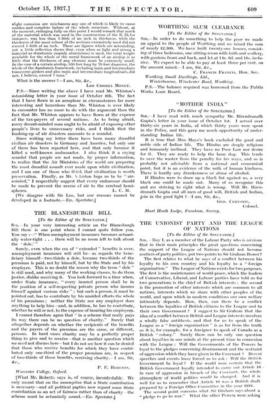THE BLANESBURGH BILL
[To the Editor of the SPECTATOR.]
Sia,—In your very interesting article on the Blanesburgh Bill there is one point where I cannot quite follow you.
You say When unemployment insurance becomes actuari- ally water-tight . . . there will be no room left to talk about the dole. "
Surely, even when the era of " extended " benefits is over, unemployment insurance will still be—as regards the bene- ficiary himself—two-thirds a dole, because two-thirds of the premium is paid, not by himself, but by the State and by his employer. This is no doubt the reason why the term " dole " is still used, and why many of the working classes, to do them justice, dislike receiving it. You look forward to a time when, under State insurance, " every insured person shall be in the position of a self-respecting private person who insures himself against various risks " ; but such a person, it must be pointed out, has to contribute by his unaided efforts the whole of his premiums ; neither the State nor any employer does anything to help him—and, in addition, he has to contribute, whether he will or not, to the expense of insuring his employees.
I cannot therefore agree that " in a scheme that really pays its way there can be no question of charity." Surely that altogether depends on whether the recipients of the benefits and the payers of the premium are the same, or different, persons. In hard cases charity may be a perfectly proper thing to give and to receive—that is another question which we need not discuss here—but I do not see how it can be denied that those who receive benefits for which they have contri- buted only one-third of the proper premium are, in respect of two-thirds of those benefits, receiving charity.—I am, Sir, &c., Worcester College, Oxford. P. E. ROBERTS.
[What Mr. Roberts says is, of course, incontestable. We
only meant that on the assumption that a State contribution is necessary—and all political parties now regard some State contribution as an act of fairness rather than of charity—the scheme must be actuarially sound.—En. Spectator.]


















































 Previous page
Previous page